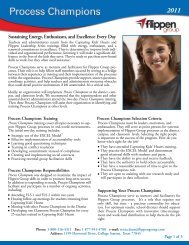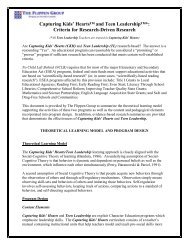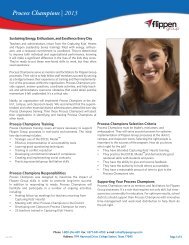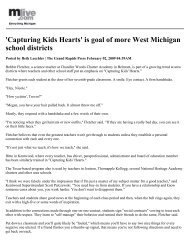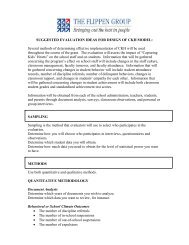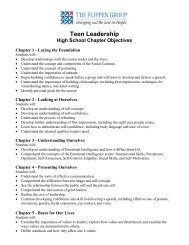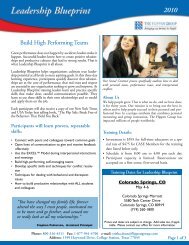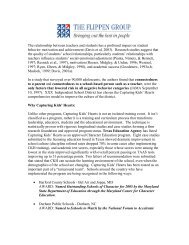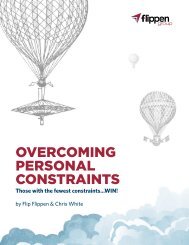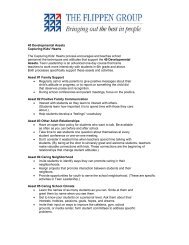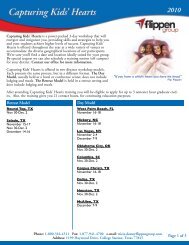Smart & Good High Schools - The Flippen Group
Smart & Good High Schools - The Flippen Group
Smart & Good High Schools - The Flippen Group
- No tags were found...
Create successful ePaper yourself
Turn your PDF publications into a flip-book with our unique Google optimized e-Paper software.
CHAPTER 5: Fostering the 8 Strengths of Character—Outcome 2or retake the test until they meet that teacher’s standard.At the same time, there’s a lot of cross-staff sharing of studentwork and collaborative discussion of what constitutesquality. Students know that.”With some students, teachers said, especially at the start,mastery learning can become a battle of wills. Oneinstructor commented:When that happens, we may send a student to anotherteacher for feedback. That way, they hear more than oneperson saying, ”It’s not good enough yet—here’s a way youcould make it better.” If they choose not to go to anotherteacher for feedback, they can go to another student. Studentsdo a lot of work in groups, so they are very comfortableseeking critique from their peers.Another teacher said:We’re very flexible in how we work with kids. In my juniorhistory class, all students had to do a two-minute speech. Aboy with Tourette Syndrome became very anxious; his ticswere getting worse and worse. So I said to him, “You cando this with me alone.” By his senior year, however, he wasdoing a 15-minute speech to the class with no problems.A student at this school offered his view of mastery learning:<strong>The</strong> benefit of mastery learning is that you have to knowyour work forwards and backwards. If your data analysis ona project isn’t good, you’ll get it back. And if you get lowerthan a B in a class, you don’t get credit for that class—youhave to retake it the following year.“<strong>The</strong>y come to set an internal barfor the quality of their work.”Through the process of mastery learning, faculty believe,students really get to see what a quality paper or productlooks like when it’s finished. In the words of one teacher:Over the four years, students come to set an internal bar forthe quality of their work. Our goal is for them to internalizethe revision process, so we gradually wean them. <strong>The</strong>y knowthat in senior year, they have only one chance to revise a paperor retake a test. <strong>The</strong>y begin to turn in quality the first time.<strong>The</strong>y know that in college they won’t get a second chance.Character is what you do on the thirdand fourth tries.—JAMES MICHENEROUTCOME 2:Diligent and Capable PerformerPromising Practice 3:2Teach study skills and holdstudents accountable for usingthem.In school, a large part of performance character is acquiringand practicing the skills needed to be a good student.Research finds that students who improve their studyskills—such as being prepared for class, time management,note-taking, and test preparation—show significantimprovement in their learning. 13Many high school teachers express particular frustrationwith students’ being unprepared for class. Said oneteacher: “More and more of our students come to classwithout the necessary materials. It’s worst with freshmen,but it’s become a problem all the way up the grades.”Students who improve in their studyskills improve in their learning.Mr. B., a veteran 9th-grade World Civilization teacher,told us: “My single greatest problem was students notbeing prepared for class. I was constantly on their case:‘Where’s your text? Where’s your notebook? What haveyou got to write with?’ By the time the bell rang, I was in alousy mood. I was thinking of getting out of teaching.”Halfway through one year, he decided to attack the problemsystematically. His strategy was to provide an incentivethat would get students to develop the habit of being prepared.At the start of the third quarter, he explained thatthere would be just two rules for the rest of the year:Be respectful to everyone—treating them as you would liketo be treated.Be prepared to work when the bell rings: at your desk withtext, planner, notebook, homework (if due), and a pen orpencil.He explained that he would be doing a “preparationcheck” at the start of class:I’ll go up and down the rows, and if you’ve got your text,planner, notebook, homework, and a pen or pencil, you’ll getan A for preparation that day. If you’re missing even one ofthese, you’ll get an F for preparation. Your preparationgrade will be 25% of your participation grade, which, as youknow, is 25% of your total grade.106<strong>Smart</strong> & <strong>Good</strong> <strong>High</strong> <strong>Schools</strong>



